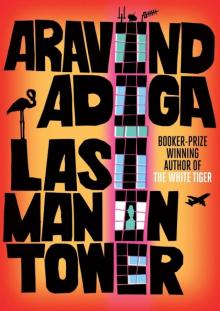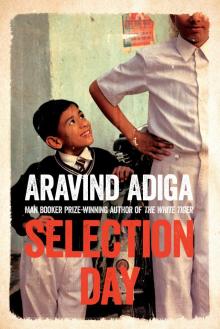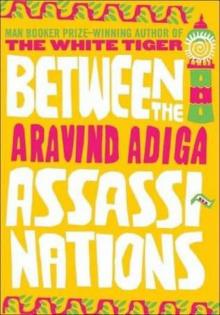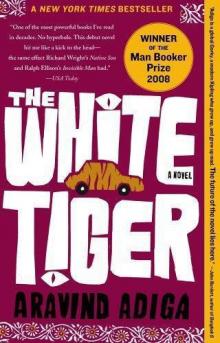- Home
- Aravind Adiga
Between the Assassinations
Between the Assassinations Read online
Between the Assassinations
Aravind Adiga
On India's south-western coast, between Goa and Calicut, lies Kittur – a small, nondescript every town. Aravind Adiga acts as our guide to the town, mapping overlapping lives of Kittur's residents. Here, an illiterate Muslim boy working at the train station finds himself tempted by an Islamic terrorist; a bookseller is arrested for selling a copy of "The Satanic Verses"; a rich, spoiled, half-caste student decides to explode a bomb in school; a sexologist has to find a cure for a young boy who may have AIDS. What emerges is the moral biography of an Indian town and a group portrait of ordinary Indians in a time of extraordinary transformation, over the seven-year period between the assassinations of Prime Minister Gandhi and her son Rajiv. Keenly observed and finely detailed, "Between the Assassinations" is a triumph of voice and imagination.
Aravind Adiga
Between the Assassinations
Copyright © 2008 by Aravind Adiga
For Ramin Bahrani
ARRIVING IN KITTUR:
Kittur is on India ’s southwestern coast, between Goa and Calicut, and almost equidistant from the two. It is bounded by the Arabian Sea to the west, and by the Kaliamma River to the south and east. The terrain of the town is hilly; the soil is black and mildly acidic. The monsoons arrive in June, and besiege the town through September. The following three months are dry and cool, and are the best time to visit Kittur. Given the town’s richness of history and scenic beauty, and diversity of religion, race, and language, a minimum stay of a week is recommended.
DAY ONE: THE RAILWAY STATION
The arches of the railway station frame your first view of Kittur as you arrive as a passenger on the Madras Mail (arrival early morning) or the West Coast Express (arrival afternoon). The station is dim, dirty, and littered with discarded lunch bags into which stray dogs poke their noses; in the evening, the rats emerge.
The walls are covered with the image of a jolly, plump, potbellied, and entirely naked man, his genitalia strategically covered by his crossed legs, who floats above a caption in Kannada that says: A SINGLE WORD FROM THIS MAN CAN CHANGE YOUR LIFE. He is the spiritual leader of a local Jain sect that runs a free hospital and lunchroom in the town.
The famous Kittamma Devi Temple, a modern structure built in the Tamil style, stands on the site where an ancient shrine to the goddess is believed to have existed. It is within walking distance of the train station, and is often the first port of call for visitors to the town.
NONE OF THE other shopkeepers near the railway station would hire a Muslim, but Ramanna Shetty, who ran the Ideal Store, a tea-and-samosa place, had told Ziauddin it was okay for him to stay.
Provided he promised to work hard. And keep away from all hanky-panky.
The little dust-covered creature let its bag drop to the ground; a hand went up to its heart.
“I’m a Muslim, sir. We don’t do hanky-panky.”
Ziauddin was small and black, with baby fat in his cheeks, and an elfin grin that exposed big, white, rabbity teeth. He boiled tea for the customers in an enormous, pitted stainless-steel kettle, watching with furious concentration as the water seethed, overspilled, and sizzled into the gas flame. Periodically, he dug his palm into one of the battered stainless-steel boxes at his side to toss black tea powder, or a handful of white sugar, or a piece of crushed ginger into the brew. He sucked in his lips, held his breath, and with his left forearm tipped the kettle into a strainer: hot tea dripped through its clogged pores into small, tapering glasses that sat in the slots of a carton originally designed to hold eggs.
Taking the glasses one at a time to the tables, he delighted the rough men who frequented the tea shop by interrupting their conversations with shouts of “One-a! Two-a! Three-a-” as he slammed the glasses down in front of them. Later, the men would see him squatting by the side of the shop, soaking dishes in a large trough filled with murky bilge water; or wrapping greasy samosas in pages ripped from college trigonometry textbooks so they could be home-delivered; or scooping the gunk of tea leaves out of the strainer; or tightening, with a rusty screwdriver, a loose nail in the back of a chair. When a word was said in English, all work stopped: he would turn around and repeat it at the top of his voice (“Sunday-Monday, Good-bye, Sexy!”), and the entire shop shook with laughter.
Late one evening, just as Ramanna Shetty was ready to close up, Thimma, a local drunk, who bought three cigarettes every night, roared with delight to see Ziauddin, his butt and thighs pressed against the giant icebox, shoving it back into the shop, inch by inch.
“Look at that whippersnapper!” Thimma said, clapping. “The icebox is bigger than him, but what a fighter he is!”
Calling the whippersnapper close, he put a twenty-five-paisa coin in his palm. The little boy looked at the shopkeeper’s eyes for approval. When Ramanna Shetty nodded, he closed his fist and yelped in English:
“Thanks you, sir!”
One evening, pressing a hand down on the boy’s head, Ramanna Shetty brought him over to the drunk and asked, “How old do you think he is? Take a guess.”
Thimma learned that the whippersnapper was nearly twelve. He was the sixth of eleven children from a farm-laboring family up in the north of the state; as soon as the rains ended, his father had put him on a bus, with instructions to get off at Kittur and walk around the market until someone took him in. “They packed him off without even one paisa,” Ramanna said. “This fellow was left entirely to his own wits.”
He again placed a hand on Ziauddin’s head.
“Which, I can tell you, aren’t much, even for a Muslim!”
Ziauddin had made friends with the six other boys who washed dishes and ran Ramanna’s shop and slept together in a tent they had pitched behind the shop. On Sunday, at noon, Ramanna pulled down the shutters and slowly rode his blue-and-cream-colored Bajaj scooter over to the Kittamma Devi Temple, letting the boys follow on foot. As he entered the temple to offer a coconut to the goddess, they sat around the green cushion of the scooter, discussing the bold red words written in Kannada on the cornice of the temple:
HONOR THY NEIGHBOR, THY GOD.
“That means the person in the house next door is your God,” one boy theorized.
“No, it means God is close to you if you really believe in Him,” retorted another.
“No, it means, it means-” Ziauddin tried to explain.
But they wouldn’t let him finish: “You can’t read or write, you hick!”
When Ramanna shouted for them to come into the temple, Ziauddin darted in with the others a few feet, hesitated, and then ran back to the scooter. “I’m a Muslim, I can’t go in.”
He had said the word in English, and with such solemnity that the other boys were silent for a moment, and then grinned.
A week before the rains were due to start, the boy collected his bundle and said, “I’m going home.” He was going to his duty to his family, to work alongside his father and mother and brothers, weeding or sowing or harvesting some rich man’s fields for a few rupees a day. Ramanna gave him an “extra” of five rupees (minus ten paise for each of two bottles of Thums Up he had broken), to make sure he would return from his village.
Four months later, when Ziauddin came back, he had developed vitiligo, and pink skin streaked his lips and speckled his fingers and earlobes. The baby fat in his face had evaporated over the summer; he returned lean and sunburned, and with a wildness in his eyes.
“What happened to you?” Ramanna demanded, after releasing him from a hug. “You were supposed to come back a month and a half ago.”
“Nothing happened,” the boy said, rubbing a finger over his discolored lips.
Ramanna ordered a plate of foo
d at once; Ziauddin grabbed it and stuffed his face like a little animal, and the shopkeeper had to say, “Didn’t they feed you anything back home?”
The “whippersnapper” was displayed to all the customers, many of whom had been asking for him for months; some who had drifted to the newer and cleaner tea shops opening up around the train station came back to Ramanna’s place just to see him. At night, Thimma hugged him several times, and then slipped him two twenty-five-paisa coins, which Ziauddin accepted silently, sliding them into his trousers. Ramanna shouted to the drunk, “Don’t leave him tips! He’s become a thief!”
The boy had been caught stealing samosas meant for a client, Ramanna said. Thimma asked the shopkeeper if he was joking.
“I wouldn’t have believed it myself,” Ramanna mumbled. “But I saw it with my own eyes. He was taking a samosa from the kitchen, and…” Ramanna bit into an imaginary samosa.
Gritting his teeth, Ziauddin had begun pushing the icebox into the shop with the back of his legs.
“But…he used to be an honest little fellow…” the drunk recalled.
“Maybe he had been stealing all along, and we just never knew it. You can’t trust anyone these days.”
The bottles in the icebox rattled. Ziauddin had stopped his work.
“I’m a Pathan!” He slapped his chest. “From the land of the Pathans, far up north, where there are mountains full of snow! I’m not a Hindu! I don’t do hanky-panky!”
Then he walked into the back of the shop.
“What the hell is this?” asked the drunk.
The shopkeeper explained that Ziauddin was now spouting this Pathan-Wathan gibberish all the time; he thought the boy must have picked it up from some mullah in the north of the state.
Thimma roared. He put his hands on his hips and shouted into the back of the shop, “Ziauddin, Pathans are white skinned, like Imran Khan; you’re as black as an African!”
The next morning there was a storm at the tea-and-samosa store. This time Ziauddin had been caught red-handed. Holding him by the collar of his shirt and dragging him out in front of the customers, Ramanna Shetty said:
“Tell me the truth-you son of a bald woman. Did you steal it? Tell me the truth this time, and I might give you another chance.”
“I am telling the truth,” Ziauddin said, touching his pink, vitiligo-discolored lips with a crooked finger. “I didn’t touch even one of the samosas.”
Ramanna grabbed him by the shoulder and pushed him to the ground, kicked him, and then shoved him out of the tea shop, while the other boys huddled together and watched impassively, as sheep do when watching one of their flock being shorn. Then Ramanna howled: he raised one of his fingers, which was bleeding.
“He bit me-the animal!”
“I’m a Pathan!” Ziauddin shouted back, as he rose to his knees. “We came here and built the Taj Mahal and the Red Fort in Delhi. Don’t you dare treat me like this, you son of a bald woman, you-”
Ramanna turned to the ring of customers who had gathered around them and were staring at him and at Ziauddin, trying to make up their minds as to who was right and who was wrong: “There is no work here for a Muslim, and he has to fight with the one man who gives him a job.”
A few days later, Ziauddin passed by the tea shop, driving a cycle with a cart attached to it; large canisters of milk clanged together in the cart.
“Look at me,” he mocked his former employer. “The milk people trust me!”
But that job did not last long either; once again he was accused of theft. He publicly swore never to work for a Hindu again.
New Muslim restaurants were being opened at the far side of the railway station, where the Muslim immigrants were settling, and Ziauddin found work in one of these restaurants. He made omelets and toast at an outdoor grill, and shouted in Urdu and Malayalam, “Muslim men, wherever in the world you are from, Yemen or Kerala or Arabia or Bengal, come eat at a genuine Muslim shop!”
But even this job did not last-he was again charged with theft by his employer, who slapped him when he talked back-and he was next seen in a red uniform at the railway station, carrying mounds of luggage on his head and fighting bitterly with the passengers over his pay.
“I’m the son of a Pathan; I have the blood of a Pathan in me. You hear; I’m no cheat!”
When he glared at them, his eyeballs bulged, and the tendons in his neck stood out in high relief. He had become another of those lean, lonely men with vivid eyes who haunt every train station in India, smoking their beedis in a corner and looking ready to hit or kill someone at a moment’s notice. Yet when old customers from Ramanna’s shop called him by his name, he grinned, and then they saw something of the boy with the big smile who had slammed glasses of tea down on their tables and mangled their English. They wondered what on earth had happened to him.
In the end, Ziauddin picked fights with the other porters, got kicked out of the train station too, and wandered aimlessly for a few days, cursing Hindu and Muslim alike. Then he was back at the station, carrying bags on his head again. He was a good worker; everyone had to concede that much. And there was plenty of work now for everyone. Several trains full of soldiers had arrived in Kittur-there was talk in the market that a new army base was being set up on the route to Cochin-and for days after the soldiers left, freight trains followed in their wake, carrying large crates that needed to be off-loaded. Ziauddin shut his mouth and carried the crates off the train and out of the station, where army trucks were waiting to be packed.
One Sunday, he lay on the platform of the station, still asleep at ten in the morning, dead tired from the week’s labor. He woke up with his nostrils twitching: the smell of soap was in the air. Rivulets of foam and bubble flowed beside him. A line of thin black bodies were bathing at the edge of the platform.
The fragrance of their foam made Ziauddin sneeze.
“Hey, bathe somewhere else! Leave me alone!”
The men laughed and shouted and pointed their lathered white fingers at Ziauddin: “We’re not all unclean animals, Zia! Some of us are Hindus!”
“I’m a Pathan!” he yelled back at the bathers. “Don’t talk to me like that.”
As he was shouting at them, something strange happened-the bathers all rushed away from him, crying, “A coolie, sir? A coolie?”
A stranger had materialized on the platform, even though no train had pulled up: a tall, fair-skinned man holding a small black bag. He wore a clean white business shirt and gray cotton trousers and everything about him smelled of money; this drove the other porters wild, and they crowded around him, still covered in lather, like men with a horrible disease gathering around a doctor who might have a cure. But he rejected them all, and walked up to the only porter who was not covered in lather.
“Which hotel?” Ziauddin asked, struggling to his feet.
The stranger shrugged, as if to say, Your choice. He looked with disapproval at the other porters, who were still hovering around, nearly nude and covered in soap. After sticking his tongue out at the other porters, Zia set off with the stranger.
The two of them walked toward the cheap hotels that lined the roads around the station. Stopping at a building that was covered in signs-for electrical shops, chemists, pharmacists, plumbers-Ziauddin pointed out a red sign on the second floor.
HOTEL DECENT
BOARDING AND LODGING
ALL FOODS AND SERVICES HERE
NORTH INDIAN SOUTH INDIAN CHINESE WESTERN
TIBETAN DISHES
TAXI PASSPORT VISA XEROX
TRUNK CALL FOR ALL COUNTRIES
“How about this one, sir? It’s the best place in town.” He put a hand on his heart. “I give you my word.”
The Hotel Decent had a good deal with all the railway porters: a cut of two and a half rupees for every customer they brought in.
The stranger lowered his voice confidentially. “My dear fellow, is it a good place, though?”
He emphasized the critical word by saying it in English.<
br />
“Very good,” Zia said with a wink. “Very, very good.”
The stranger crooked his finger and beckoned Zia closer. He spoke into Zia’s ear:
“My dear fellow: I am a Muslim.”
“I know, sir. So am I.”
“Not just any Muslim. I’m a Pathan.”
It was as if Ziauddin had heard a magic spell. He gaped at the stranger.
“Forgive me, sir…I…didn’t…I…Allah has sent you to exactly the right porter, sir! And this is not the right hotel for you at all, sir. In fact, it is a very bad hotel. And this is not the right…”
Tossing the foreign bag from hand to hand, he took the stranger around the station to the other side-where the hotels were Muslim owned, and where cuts were not given to the porters. He stopped at one place and said, “Will this do?”
HOTEL DARUL-ISLAM
BOARDING AND LOGING
The stranger contemplated the sign, the green archway into the hotel, the image of the Great Mosque of Mecca above the doorway; then he put a hand into a pocket of his gray trousers and brought out a five-rupee note.
“It’s too much, sir, for one bag. Just give me two rupees.”
Zia bit his lip.
“No, even that is too much.”
The stranger smiled. “An honest man.” He tapped two fingers of his left hand on his right shoulder. “I’ve got a bad arm, my friend. I wouldn’t have been able to carry the bag here without a lot of pain.” He pressed the money into Zia’s hands. “You deserve even more.”
Ziauddin took the money; he looked at the stranger’s face. “Are you really a Pathan, sir?”
The boy’s body shivered at the stranger’s answer.
“Me too!” he shouted, and then ran like crazy, yelling, “Me too! Me too!”
-->

 Last Man in Tower
Last Man in Tower Selection Day
Selection Day Between the Assassinations
Between the Assassinations The White Tiger
The White Tiger The White Tiger: A Novel
The White Tiger: A Novel